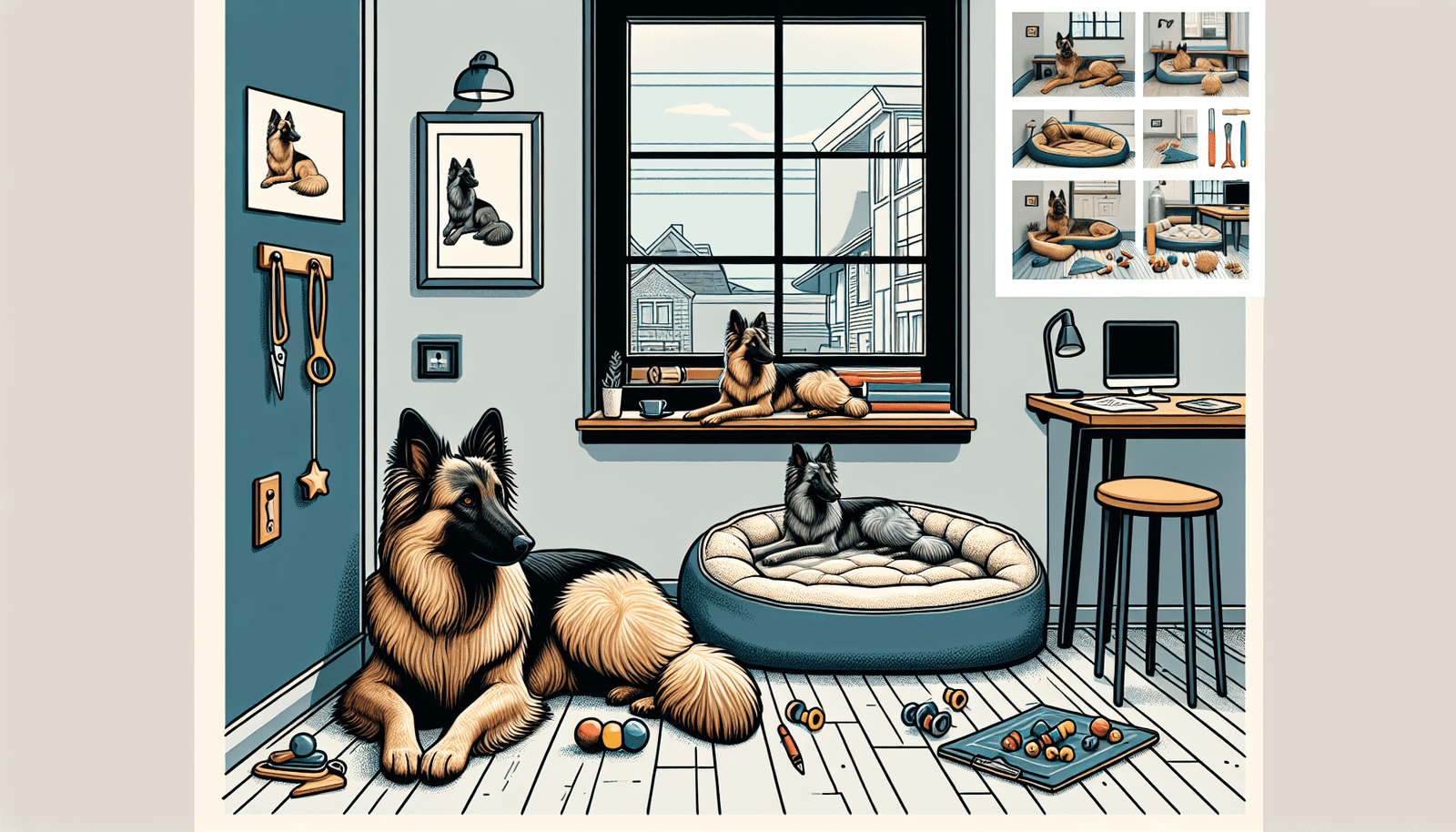Imagine having a loyal and adventurous companion who never leaves your side, but what happens when you need to step out of the house? The question of whether Dutch Shepherds can be left alone is one that many prospective dog owners ask. These intelligent and energetic dogs are known for their strong bonds with their owners, but can they handle being left by themselves? In this article, we will explore the unique characteristics of Dutch Shepherds and determine if they can handle solitude or if they require constant company. Let’s uncover the truth behind this intriguing question.

Understanding Dutch Shepherds
Overview of Dutch Shepherds
Dutch Shepherds are a versatile and intelligent breed originating from the Netherlands. Known for their agility, strength, and loyalty, they were traditionally used as herding dogs. Today, they are popular as working dogs, search and rescue animals, and beloved family pets. Dutch Shepherds are medium-sized dogs with a muscular build, and their unique brindle or fawn-colored coats make them easily recognizable.
Characteristics and Temperament
Dutch Shepherds possess a range of desirable traits that make them excellent companions. They are highly intelligent, trainable, and eager to please. Their natural instincts as herding dogs make them vigilant and protective, making them wonderful watchdogs. Furthermore, they are known for their loyalty and affection towards their human family members. Dutch Shepherds are generally friendly, social, and get along well with children and other animals when properly socialized.
Level of Activity
As an energetic breed, Dutch Shepherds require regular mental and physical stimulation to remain content and healthy. They love to be engaged in various activities that challenge their intelligence and physical abilities. Regular exercise such as brisk walks, jogging, agility training, and interactive play sessions are essential to meet their activity needs. Failing to provide adequate exercise can lead to boredom, restlessness, and potential behavioral problems.
Dutch Shepherds and Alone Time
Dutch Shepherds’ Dependency
Dutch Shepherds thrive in the company of their human family and can be prone to developing separation anxiety if left alone for extended periods. They form strong bonds with their owners and may become anxious or distressed when separated. It is important to understand and address their dependency needs to ensure their well-being and prevent behavioral issues.
Separation Anxiety
Separation anxiety is a common problem among Dutch Shepherds and can manifest in various ways, including excessive barking, destructive behavior, and even self-harm. Dogs with separation anxiety experience extreme distress when left alone and may exhibit behaviors such as pacing, excessive drooling, and inappropriate elimination. It is crucial to address separation anxiety promptly and provide the necessary support to help your Dutch Shepherd cope with being alone.
Behavioral Issues
When Dutch Shepherds are left alone for extended periods without proper preparation and training, they may develop behavioral issues. These can include excessive barking, digging, chewing, and attempts to escape. These behaviors are often a result of boredom, anxiety, or a lack of mental and physical stimulation. It is important to address these issues early on to maintain a harmonious living environment and ensure the well-being of your Dutch Shepherd.
Factors Affecting Dutch Shepherds’ Alone Time
Age of the Dog
The age of your Dutch Shepherd plays a significant role in determining their ability to be left alone. Young puppies require more attention and care due to their limited bladder control and their need for frequent socialization and training. Older Dutch Shepherds, on the other hand, tend to be more independent and are generally more capable of staying alone for longer periods. However, it is essential to consider each dog’s individual needs and make adjustments accordingly.
Training and Socialization
Proper training and socialization play a crucial role in preparing Dutch Shepherds to be left alone. Consistent training, including obedience commands, crate training, and positive reinforcement, can help build their confidence and independence. Socializing them with other dogs, people, and various environments from a young age can also contribute to their ability to adapt to different situations and be more comfortable when alone.
Health and Exercise Needs
A Dutch Shepherd’s physical and mental well-being greatly affects their ability to be left alone. Regular exercise, such as daily walks and playtime, helps fulfill their energy needs and prevents restlessness. Additionally, maintaining their overall health through regular vet check-ups, a balanced diet, and providing mental stimulation can contribute to their overall well-being and improve their resilience when left alone.

Leaving Dutch Shepherds Alone for Short Periods
Preparation and Environment
When leaving Dutch Shepherds alone for short periods, it is crucial to create a safe and comfortable environment for them. Ensure they have access to fresh water, a comfortable resting area, and engaging toys to keep them occupied. Consider puppy-proofing the space to prevent any accidents or access to potentially dangerous items. Leaving a radio or TV on at a low volume can also provide comforting background noise.
Gradual Training
Gradual training is key to building your Dutch Shepherd’s independence and confidence when left alone. Begin by leaving them alone for short periods and gradually increase the duration over time. Start with just a few minutes and gradually work up to an hour or more. Use positive reinforcement techniques, such as rewarding calm behavior, to encourage them to associate being alone with positive experiences.
Mental Stimulation and Enrichment
To prevent boredom and anxiety when left alone, provide mental stimulation and enrichment activities for your Dutch Shepherd. Puzzle toys, treat-dispensing toys, and interactive games can keep their minds engaged and provide hours of entertainment. Consider rotating their toys regularly to keep them interested. In addition, leaving them with a frozen Kong filled with treats or a food puzzle toy can provide mental stimulation and make the alone time more enjoyable.

Leaving Dutch Shepherds Alone for Extended Periods
Arranging for Dog Care
Leaving Dutch Shepherds alone for extended periods, such as a full workday, may not be ideal for their well-being. However, if it is necessary, it is essential to arrange for proper dog care. This can involve hiring a dog sitter, who can spend time with your Dutch Shepherd, take them for walks, and provide companionship. Another option is to hire a dog walker who can visit during the day to break up the alone time and ensure your dog gets exercise and attention.
Doggy Daycare or Boarding
For longer periods of absence, consider enrolling your Dutch Shepherd in a reputable doggy daycare facility or arranging for boarding. Doggy daycare provides supervised playtime, socialization, and mental stimulation, which can help alleviate separation anxiety and prevent boredom. Boarding facilities offer a safe and structured environment where your Dutch Shepherd can receive proper care and attention.
Dog-Sitters or Dog-Walkers
If hiring a dog sitter or dog walker, ensure they are experienced with Dutch Shepherds and understand their needs. Provide clear instructions regarding feeding, exercise routines, and any specific concerns you may have about your dog. Regular communication with the sitter or walker can help you stay updated on your Dutch Shepherd’s well-being and address any issues promptly.
Alternative Options for Dutch Shepherds
Getting a Companion for Your Dutch Shepherd
Consider getting a companion for your Dutch Shepherd if leaving them alone for extended periods is unavoidable. Another dog can provide companionship and help alleviate separation anxiety. Before introducing a new dog into your household, ensure proper introductions and compatibility between the two dogs. It is recommended to consult with a professional dog trainer or behaviorist to guide you through the process.
Dog Enrichment Toys
Enrichment toys, such as Kong toys, puzzle toys, and interactive feeders, can help keep your Dutch Shepherd mentally stimulated and engaged when left alone. These toys can be filled with treats or food, challenging your dog’s problem-solving abilities and providing entertainment. Rotate the toys regularly to keep your Dutch Shepherd interested and ensure they have a variety of options to stimulate their curiosity.
Dog Cameras and Interactive Devices
Technology can also play a role in keeping your Dutch Shepherd entertained and connected when left alone. Dog cameras allow you to monitor your dog remotely through a smartphone or computer. Some cameras even have interactive features that allow you to dispense treats or play games with your dog. While these devices can provide stimulation and reassurance, they should not be relied upon as a substitute for proper care and attention.
Training and Preparing Dutch Shepherds for Alone Time
Building Independence Gradually
Help your Dutch Shepherd build independence gradually through consistent training and exposure to alone time. Start by leaving them alone for short periods while you are still at home. Increase the duration gradually and reward calm behavior. This gradual approach can help build their confidence and reduce separation anxiety.
Crate Training
Crate training can be beneficial for Dutch Shepherds when left alone. A properly introduced and comfortable crate can serve as your dog’s safe space, providing a sense of security. Crate training should be done gradually and positively to ensure your Dutch Shepherd associates the crate with a positive experience. Make sure the crate is appropriately sized, comfortable, and stocked with toys or treats to keep them occupied.
Positive Reinforcement
Positive reinforcement training techniques are crucial when preparing Dutch Shepherds for alone time. Rewarding desired behaviors, such as calmness and independence, with treats, praise, or playtime can help create positive associations with being alone. Consistency and patience are key to achieving the desired results. Understanding that each dog is unique and may respond differently to training methods is important to tailor the approach to your Dutch Shepherd’s individual needs.
Avoiding Separation Anxiety in Dutch Shepherds
Establishing a Routine
Establishing a consistent routine can help Dutch Shepherds feel more secure and reduce anxiety when left alone. Stick to a regular schedule for feeding, exercise, playtime, and alone time. Gradually incorporate alone time into your daily routine to help your Dutch Shepherd adapt and understand that periods of separation are a normal part of life.
Confidence Building Exercises
Engaging in confidence building exercises can help Dutch Shepherds become more self-assured and less prone to separation anxiety. These exercises may include agility training, obedience training, and exposure to new environments and experiences. Positive reinforcement during these exercises can boost your dog’s confidence and overall emotional well-being.
Desensitization Techniques
Desensitization techniques involve gradually exposing your Dutch Shepherd to situations that trigger anxiety, such as picking up your keys or putting on your coat, without actually leaving. This can help them become less reactive and associate these triggers with less distress. Gradually increase the duration of these desensitization sessions to help your dog build tolerance and reduce separation anxiety.
Seeking Professional Help
Consulting a Dog Trainer or Behaviorist
If you’re struggling with your Dutch Shepherd’s separation anxiety and alone time issues, seeking the help of a professional dog trainer or behaviorist can be beneficial. A trained expert can assess your dog’s specific needs and provide personalized guidance and training techniques to address their anxiety. They can help develop a comprehensive behavior modification plan tailored to your Dutch Shepherd’s individual requirements.
Behavior Modification Therapies
Behavior modification therapies, such as desensitization and counter-conditioning, can be effective in treating separation anxiety in Dutch Shepherds. These therapies involve gradually exposing the dog to triggers that cause anxiety and pairing them with positive experiences. Over time, this can help change the dog’s emotional response and reduce separation anxiety.
Support Groups or Online Communities
Participating in support groups or engaging with online communities dedicated to Dutch Shepherds or separation anxiety can provide valuable insights and support. Connecting with other dog owners who have faced similar challenges can offer comfort and guidance in managing your Dutch Shepherd’s behavior. Sharing experiences, tips, and success stories can be empowering and help you stay motivated throughout the training process.
Conclusion
Personalized Approach for Each Dutch Shepherd
While Dutch Shepherds can be left alone for short periods, their alone time requirements vary depending on their age, training, and individual needs. It is crucial to assess and understand your Dutch Shepherd’s temperament, energy levels, and behavior to create a personalized approach to their alone time.
Positive Results with Proper Training and Care
With the right training, socialization, and care, Dutch Shepherds can adapt to being alone and remain content. Gradual training, mental stimulation, and establishing a routine can prevent separation anxiety and behavioral issues. Providing companionship, enrichment toys, and appropriate care options for extended periods of absence can also minimize the negative effects of being alone.
Balancing Work and Pet Ownership
Balancing the demands of work and pet ownership can be challenging, especially for those who own Dutch Shepherds. However, by investing time and effort into preparing your dog for alone time, seeking professional guidance when needed, and exploring alternative options, it is possible to maintain a harmonious relationship between work and your Dutch Shepherd’s well-being. With proper training and care, you can enjoy the love, loyalty, and companionship of your Dutch Shepherd for years to come.

